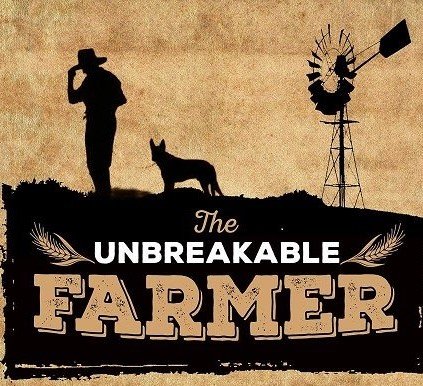Resilience in Rural Communities: A Perspective from The Unbreakable Farmer, Warren Davies
Living in rural Australia, you're no stranger to nature’s fierce unpredictability.
As someone who has seen and lived through it , and witnessed firsthand the impact and recovery communities endure, I understand the toll that unrelenting droughts, floods, bushfires and storms can have on farming communities. These challenges don’t just impact crops, livestock, or livelihoods — they leave lasting scars on the mental health of those trying to survive through them.
What people often forget is that a farmer's relationship with the land is intimate.
When your livelihood depends on the soil beneath your feet and the skies above, adversity becomes personal. It strikes at the core of your identity, your self-worth, and your sense of purpose. In such difficult times, building grassroots support networks becomes the key to survival, especially when traditional forms of support are sporadic, inconsistent, or dependent on funding models that fail to deliver continuity.
“Resilience isn’t so much a character trait, but an action born out of lack of other options. ”
The Mental Health Impact of Adversity
I’ve seen it, and I’ve lived it. Prolonged droughts can decimate not only crops but also a farmer’s sense of hope. A flood may wash away months or even years of hard work in a matter of hours. Bushfires can destroy everything—home, livelihood, and community—in mere moments. These events don’t just lead to financial ruin; they lead to emotional exhaustion, mental burnout, and deep-rooted stress. Many farmers, faced with these repetitive cycles of loss, find themselves battling depression, anxiety, and even suicidal thoughts.
But here’s the reality: when disaster strikes, rural communities are often left to fend for themselves. Government support, while available in some cases, is slow to materialise. Mental health services, though improving, are still woefully inadequate for those in remote and regional areas. Often, the very systems set up to help are hamstrung by temporary funding models that come and go like the seasons, leaving gaps where people need stability the most.
This discontinuity creates an additional layer of stress, as it feels like the support you might rely on today could be gone tomorrow. The result is that many farmers and community members feel abandoned, isolated, and unsupported when they need help the most. The traditional support systems just don’t seem to stick around long enough to make a real, lasting impact.
The Power of Grassroots Support Networks
This is where grassroots support comes into play. In my own experience, one of the most powerful things we can do is build support networks from within our own communities. These are people who understand exactly what you’re going through because they’ve lived through it themselves. They don’t need an outsider to tell them how hard it is; they already know. And they’re willing to offer a hand because they know you’d do the same for them.
There’s an authenticity in grassroots support that you often don’t find in other forms of aid. It’s about community, connection, and solidarity. When the funding for mental health services dries up, or when bureaucratic systems take too long to deliver, it’s the neighbor down the road who’s going to check in on you. It’s the local farming group that’s going to organize a community barbecue or a weekend get-together to give people a chance to take a break from their struggles. It’s these small acts of kindness, empathy, and understanding that help carry people through the darkest times.
Grassroots networks may not be a cure-all, but they provide a crucial safety net for rural communities facing adversity. In the absence of consistent government or organizational support, these networks act as a buffer, helping people stay connected and reminding them that they’re not alone. Isolation is one of the biggest factors in deteriorating mental health, and when people feel isolated, their ability to cope diminishes. These grassroots efforts help break down that isolation by fostering a sense of belonging, shared experience, and mutual support.
Building Stronger Networks in the Face of Inconsistent Support
In rural Australia, there’s a saying: “You’ve got to look after your own.” It’s a sentiment born of necessity, but also of resilience and determination. When official support fails to be consistent, rural communities have no choice but to look inward and build their own systems of support.
I’ve seen how local groups, farming collectives, and informal networks can come together in times of crisis. People pool their resources, share information, and lend each other a helping hand. These networks thrive not because they have an abundance of financial resources, but because they are grounded in real relationships and an understanding of shared struggle.
One of the biggest challenges we face in rural communities is ensuring that these networks remain strong, even when outside support is inconsistent. This involves recognising that mental health is just as important as physical health or economic survival. It’s about normalizing conversations about mental health and making sure that people know it’s okay to ask for help. We need to encourage people to keep checking in on each other, organizing social events, and offering a listening ear.
The Road Ahead
Rural communities will continue to face adversity. That’s a fact we can’t escape. But we can choose how we respond to it. By building grassroots networks, we are creating a form of resilience that goes beyond what money can buy. We’re building a system of support that is embedded in the fabric of our communities, one that can stand the test of time and help carry us through the next drought, flood, or bushfire.
As The Unbreakable Farmer, I’ve seen the importance of these networks firsthand.
They aren’t just a safety net—they’re a lifeline. And in a world where traditional forms of support come and go, that kind of connection is more important than ever.




